
What is Pigeon
By now, we all know what Pigeon is about. A quick recap for those who are behind….On July 24th, Google launched a new local algorithm, later dubbed Pigeon by Search Engine Land. Results are still coming in though it appears the algorithm is a huge shake up in local search as both Google Maps and Web results were impacted. It is supposed to provide more useful, relevant and accurate local search results which are more closely tied to traditional web search ranking signals. (I will prove later why I think this is bullshit.) As of now, Pigeon has only rolled out to US results though it will most likely roll out to other countries and languages in the near future.
Pigeon Implications
The new algorithm ties deeper into Google’s web search capabilities. What’s that mean? It means the local search section is now going to use ranking signals similar to organic search. Prior to the update, the organic listings were using a different algorithm from the local search listings.
Breaking it down even further, Google is taking local into account much more now. “Wait a minute” you say. “Wasn’t Google’s local algorithm already taking local into account?” You’d be correct with that statement, though now Pigeon is upping the ante. Early indications show Google is zeroing in on the center of a particular city, then using your query to find specific goods/services closest to the city’s center. For instance, if you are searching for Skokie pizza, Google will use the center of Skokie, IL as the basis for the search and return pizza restaurants most near it. There are also other various theories suggesting Google may be using your IP and will return results most near where your IP is located.
Google is using Latent Semantic Indexing (LSI) in the localized algorithm now as well. This technology has been used in the organic algorithm for quite some time, since at least 2010, and now it makes its way to local. LSI is a technological process in which the search engines index a web page and give weight to the website’s central theme rather than to specific keywords. The engines will sort sites based on the frequency of a variety of terms and key phrases linked together instead of focusing on the frequency of a single term within the text.
Since Google is now using organic-like factors in ranking, we can assume clicks, customer engagement, bounce rate and domain authority could also be used in the new Pigeon algorithm. I suspect it may be too early to come to any conclusions about these factors as of now.
Take a close look and you will notice a few prominent changes appearing in the Map Pack. With many queries the Map Pack has decreased significantly – going from 7 listings down to 3 and from 3 down to 0 in many cases. Mozcast and Whitespark conducted separate tests and reported a 23.4% drop in local packs. This is a dramatic change and creates an even more fierce competition in local.
There does appear to be less duplication in the SERP’s and Map Pack with some queries as compared to before. Other queries, like this one, have more duplication. Hooray Estrella!

Directory Websites
Two of the more prominent winners in the algorithm update were (1) Yelp and (2) other local directories. Earlier in July, Yelp accused Google of stealing its search traffic and they then leaked their study to TechCrunch. To sum up Yelp’s accusations, they accuse Google of promoting Google + and other Google properties above them in the searches. Now, their whining seemed to earn them a place on Page 1.
Maybe we should just call this the Yelp update. I mean, look at this:
Yelp grabs the top TWO spots when searching for Chicago Chinese restaurants, followed by YP.com, Urban Spoon and then several other directories. Apart from the carousel, there aren’t any local restaurants within the first 8 listings, and the Map Pack is gone.
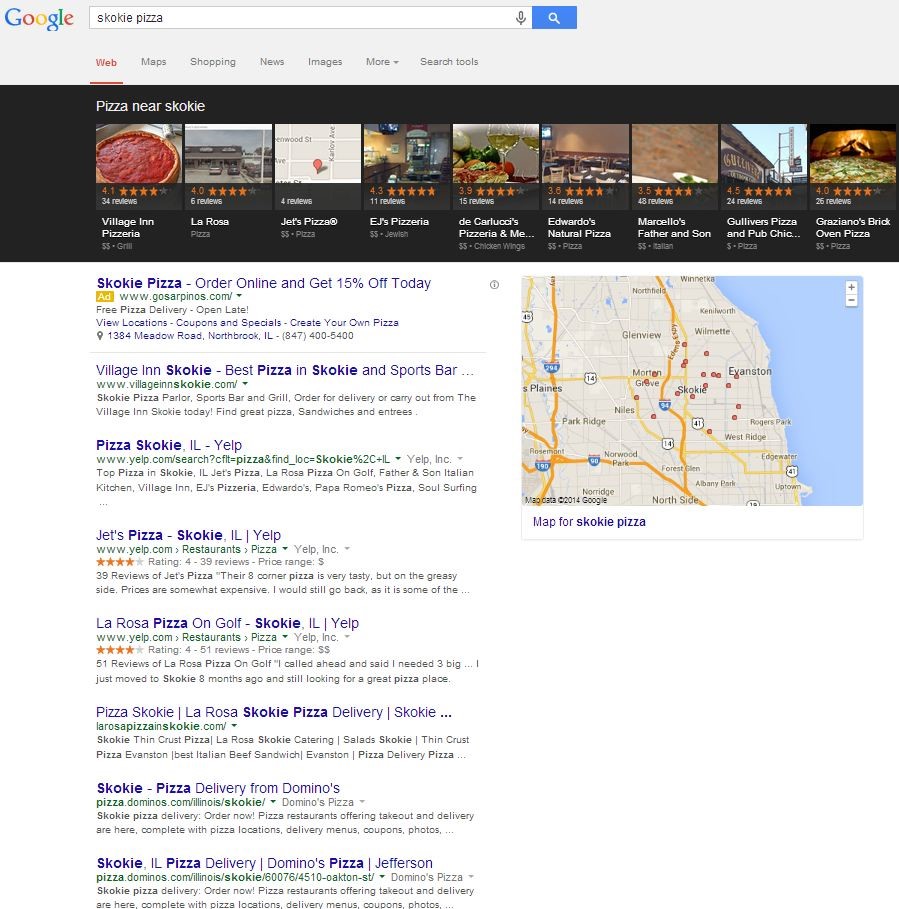

This time we get the carousel again and, what’s that!? A local listing! Found one guys! Yelp takes the next THREE spots followed by another local pizza place (which is also the Yelp listing directly above it) and then Dominos twice. Don’t overlook the PPC ad directly below carousel as well.
A search for Seattle seafood restaurants yields carousel, PPC and then all directories. Not one listing on the first page for any local Seattle restaurant. Is this helpful for searchers?
Good win for Yelp and other directories. I can’t really complain too much since SSF gained a bit of traction or at a minimum, didn’t lose any. Is this the user experience Google is going for though?
Spammy Results
This is why I think Pigeon is bullshit, at least in Version 1 (as I write this, I see Google may be updating Pigeon already). In researching several industries, I noticed the results are less than ideal and in many cases, worse than before the Pigeon update. To me, the quality of the SERP’s has taken a hit. This can’t be a good experience for users or Google. Look at these results for instance:
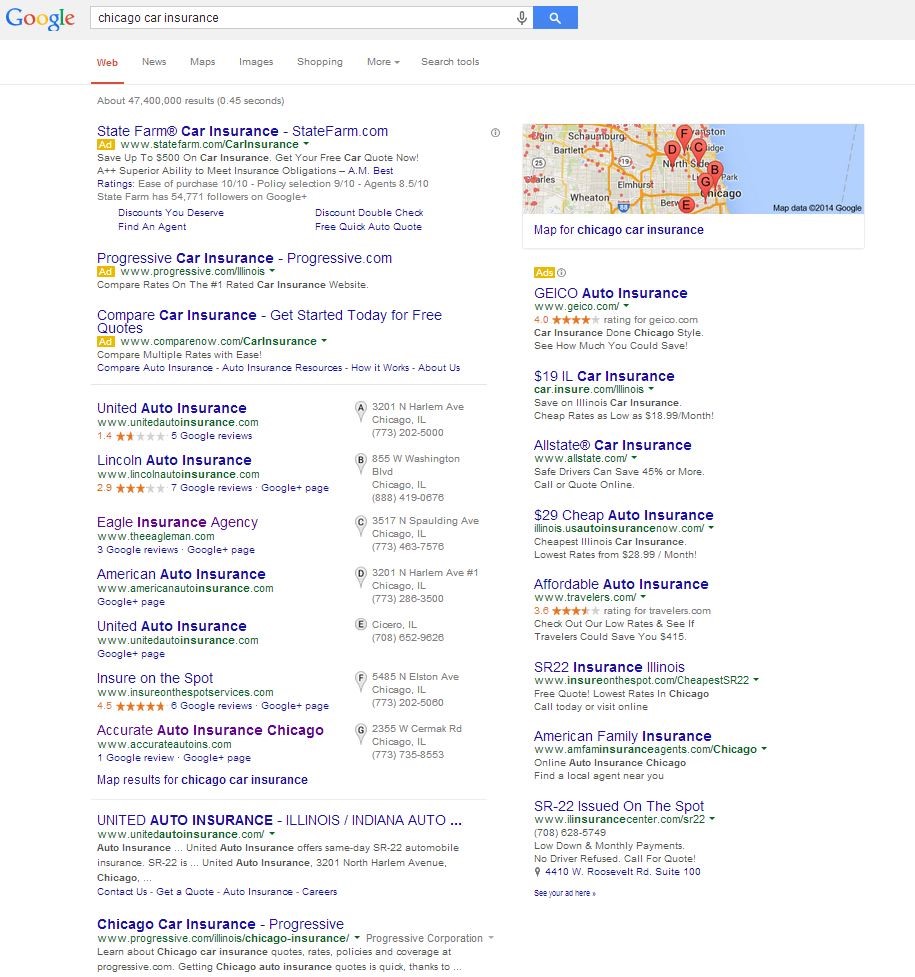

A search for Chicago car insurance shows PPC ads, because of course, then a mystical 7 Map Pack, followed by Organic. Look closely at the Map Pack though. The first two listings have terrible reviews. Why would Google promote or want companies with terrible reviews coming up first? I understand the review process and how things can get skewed but still, if I am looking for car insurance and see those 2 companies with poor reviews, I’m skipping over them. Maybe a lack of clicks and high bounce rate will see those companies move down and out, but for now they are there.
A search of Chicago home insurance isn’t any better. Ads followed by Yelp, Illinois.gov, YP and then the Map Pack. Again, if I’m searching for home insurance, I don’t want to see Yelp and YP at the top. I want agents or companies who can help me with my insurance needs.
This next one may be the most egregious. Search for Cleveland car insurance and you’ll find this:
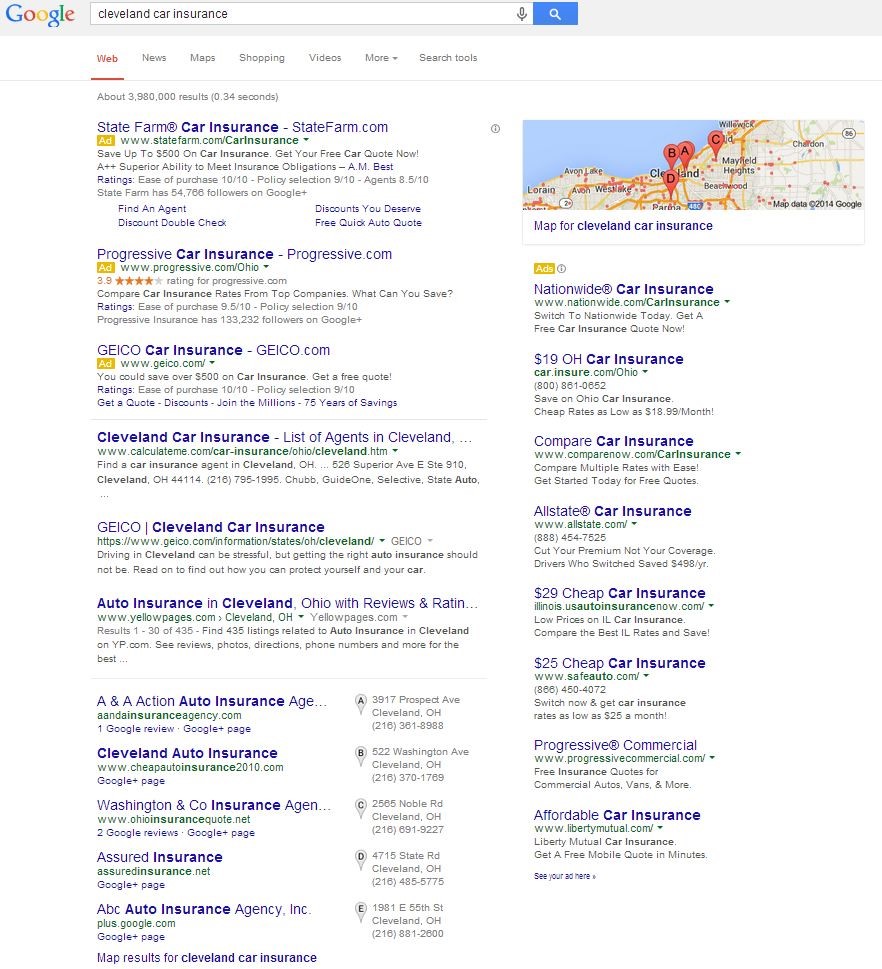

Ads, Calculateme, Geico, YP and the Map Pack. Look closely at the Map Pack. The second listing, which was first earlier in the day, is a website which doesn’t exist. It is a fu***** parked domain! The phone number doesn’t even work! I called the number and it is disconnected. Look at the URL! How is this site ranking? Where did the address and phone information come from?
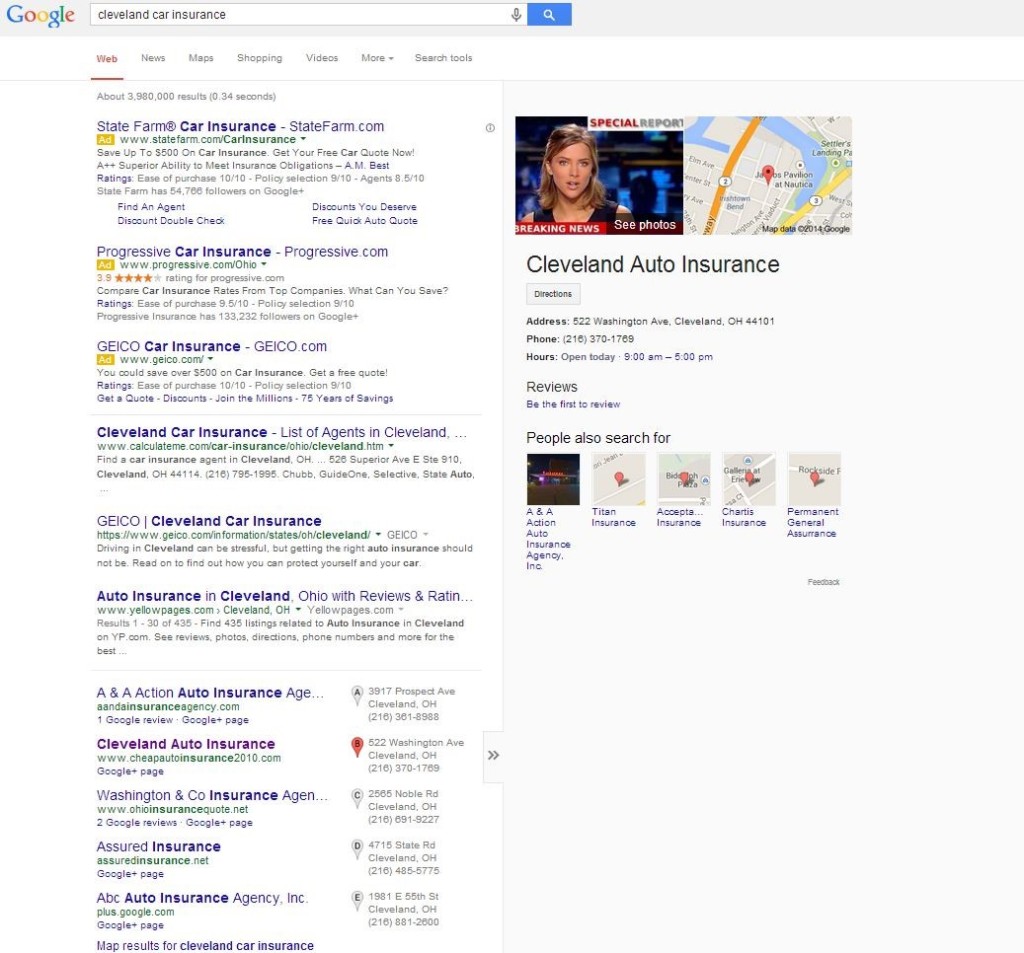

Look again. This is the information which comes up when you click on the arrows for more information. Incredible.
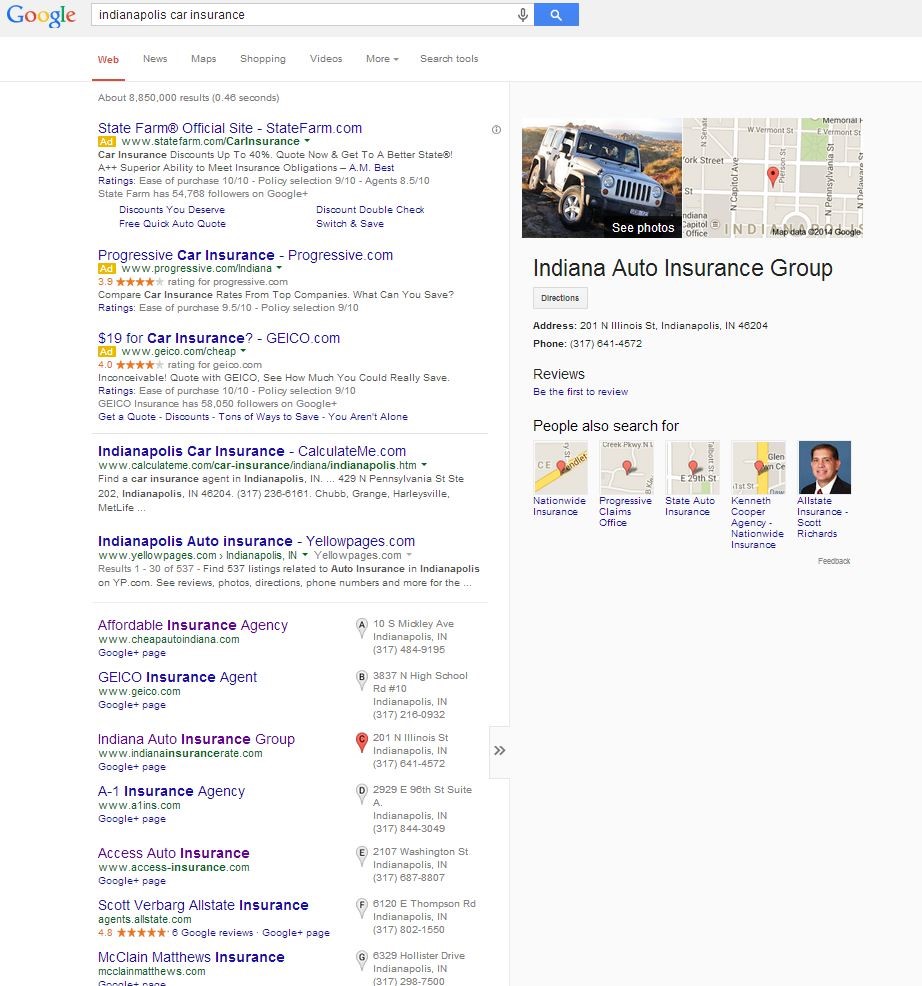

A search for Indianapolis car insurance returns similar results with Calculateme and YP coming up first. There are a few mysteries in this Map Pack. Geico is listed with an agent contact, though they are strictly an online business with no actual insurance agents. Indiana Auto Insurance Group is un-kept, low quality and spammy. This site wouldn’t survive Panda, yet it is listed 3rd in the Map Pack.
Lastly, Miami car insurance. Big win for Estrella Insurance here as they take 4 of the coveted 7 Map Pack listings and the #1 Organic spot.



Most of these are spammy results. Some are outright pages which don’t exist. Others are what I believe to be awful websites which should have been squashed by Panda. Why are they showing up in the Map Pack? Where is Google getting the data from? How can this be a positive experience for people searching for insurance?
Maybe, just maybe if there is enough traction and whining about shitty search results in the SERP’s, another change will be made. Who knows…though it worked for Yelp.
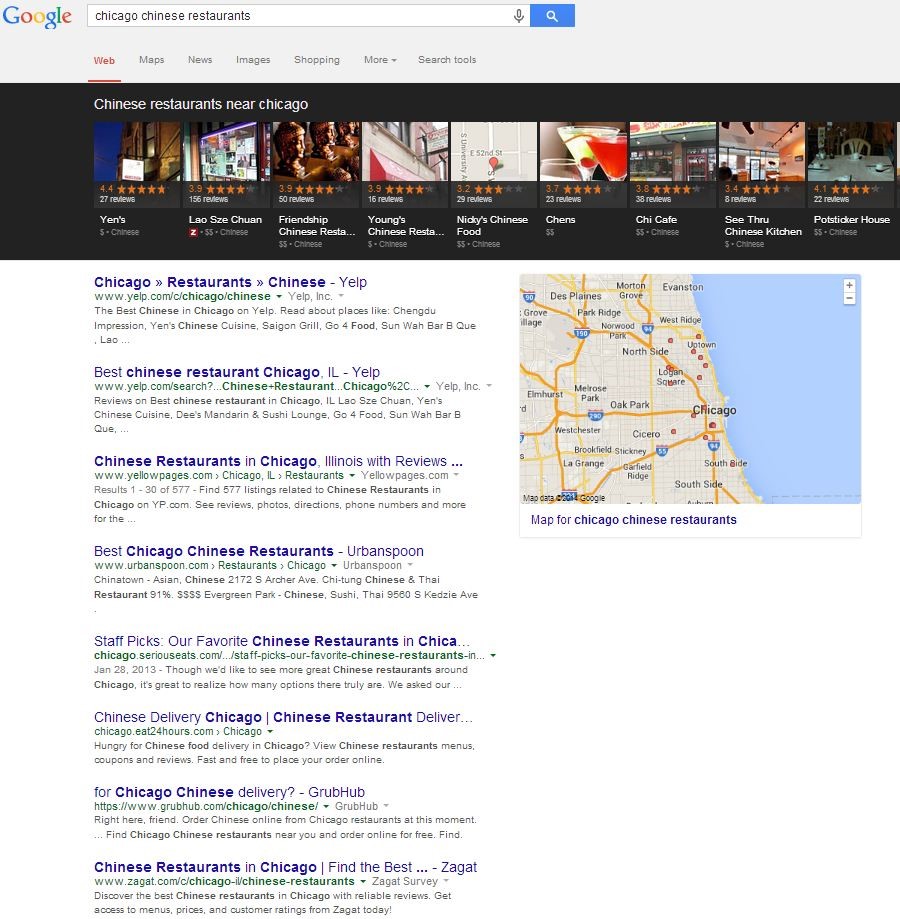
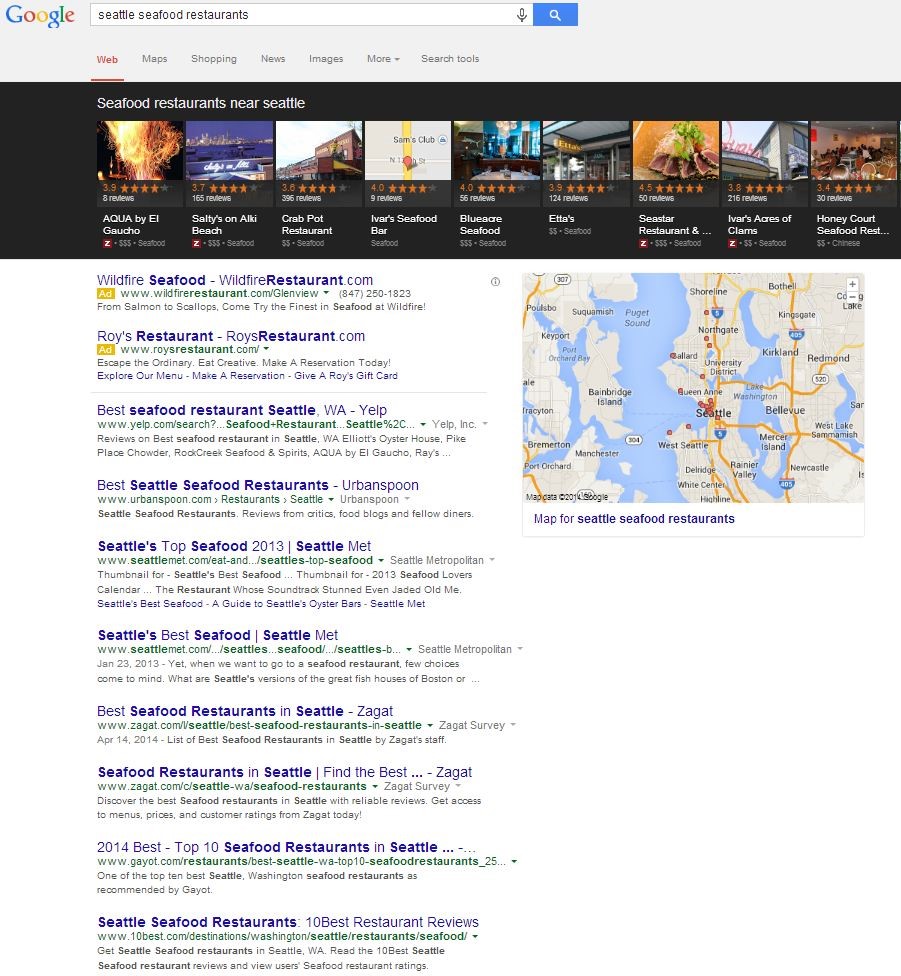
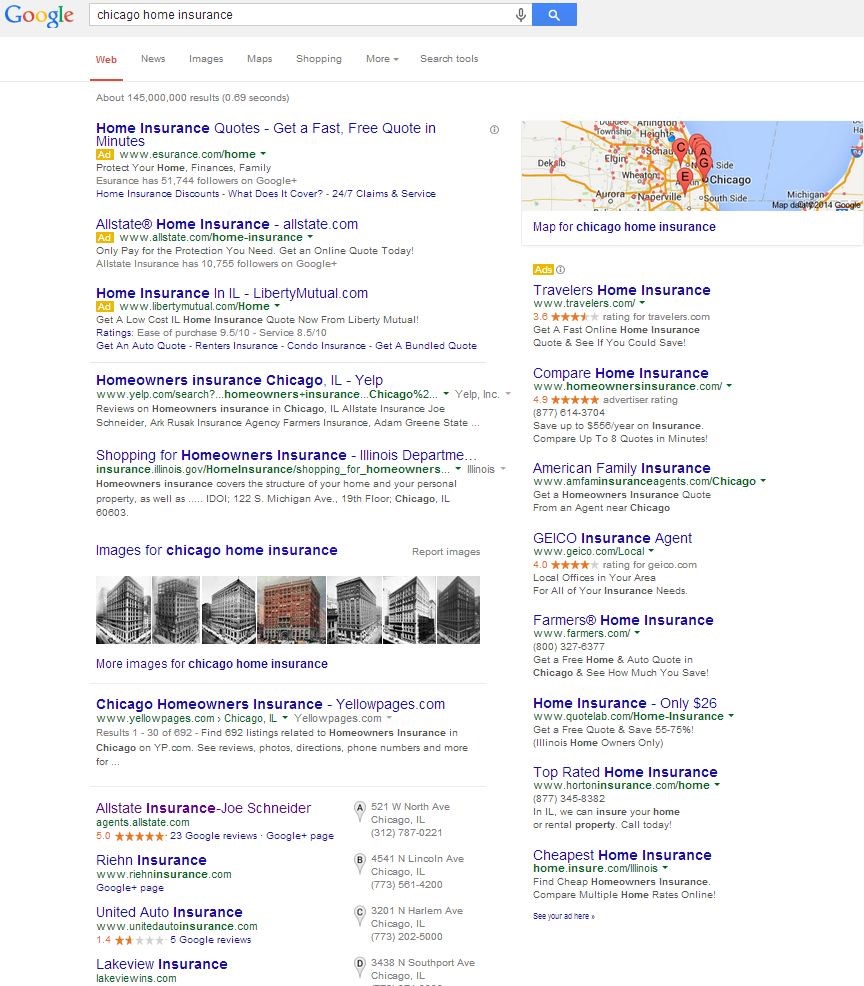
Also noticed the Knowledge Graph photo for “Cleveland Auto Insurance” is one of those blatantly overused stock photos seen for years in Yahoo mail ads. Just awful.
Exactly! How is that helpful/relevant to anyone?
Thanks for reading and for the comment as well.
Great Article, the snapshots really help emphasize your points and distinguish the clarity of the problem that is at hand with this update, at least in its’ current state. My favorite point made in this article was the fact that sometimes you don’t want to see a yelp page or review site, you just want help with your current situation. This sparked an idea that I had about the future of SERPS. I think that review sites may have their own tab in the future, similar to that of Google Images.This would allow the searcher to easily distinguish to Google if they need an opinion on how a business has treated customers in the past (review site), or are merely searching for the business itself (actual website). Especially since Facebook is getting so big with reviews as well. Now there are 3 major review sites, G+, Yelp, and Facebook. It’s making it harder for customers and businesses alike. Where do you tell your customers where to review your business, and where do you as a customer look for the best reviews? Any thoughts?
Thanks for reading and the well thought out comment, Brad.
Your thinking out of the box and I love it! You bring up a great theory…one I had not thought of myself prior to this. It will be interesting to see if Google does anything with Pigeon or if they do decide to go a different route with review sites because, as you mention, the review sites are getting huge and are gaining authority/credibility. Im hesitant to say Google will put them in a separate “tab” though. It would clear up the SERPs quite a bit but Id imagine the clicks and conversions for those Review sites would plummet. You saw what just happened when Yelp complained about Google taking their traffic. Imagine if Google moved them to a different tab and clicks dropped, say 50%?! Yelp would have a shit fit again. Where would Google draw the line on the tabs as well? Review sites only? Directories too? Could get a bit confusing and overwhelming for consumers. I like that youre taking a different approach to how the SERPs could work and what the future of Search Engines would look like.
Great comment and discussion!
I see what you’re saying, the fact that people could potentially not see the tab if they moved all the review sites to somewhere else could prove to be a huge problem, but google could make a big pointy red arrow to show people that they’ve all been moved to somewhere else. I don’t know if it would be the perfect solution but I agree with what you were saying, sometimes you don’t care about a yelp profile, you just want to get to the site in the fewest amount of clicks, especially on a phone where loading isn’t as instantaneous. Another thought entirely is that instead of the actual profiles themselves appearing, maybe it would highlight a specific review or small list of reviews of that business come up. For example, my sister is an avid yelper- she’s given many quality reviews to tons of different places. For people like this (people with high authority on said review sites who have proven themselves to be, for the most part honest and unbiased) maybe Google will start pulling specific reviews OFF of the review profile to give the new searcher an instantaneous example of how their experience was. It wouldn’t work for all businesses with few reviews but I for one would like to be saved the trouble of having to scroll through all of the reviews when I may just want to hear what one or two people have to say about it. It would make Yelp take the “recommended reviews” more seriously than they have been (as soon as you pay them all of your reviews mysteriously are now approved) and allow people who take reviewing seriously to have more of an impact. This isn’t likely to happen because businesses would likely throw a fit, but I think if people took reviewing seriously, it would help other searchers a lot.